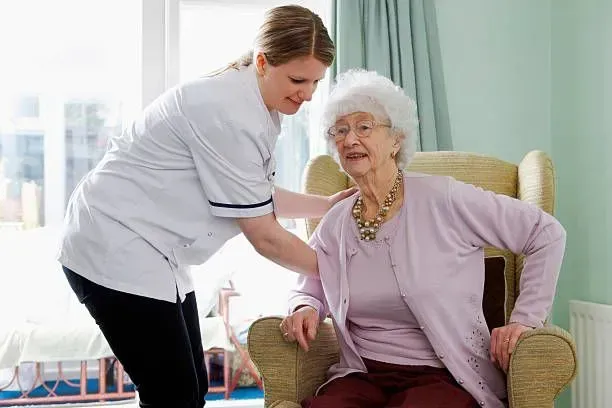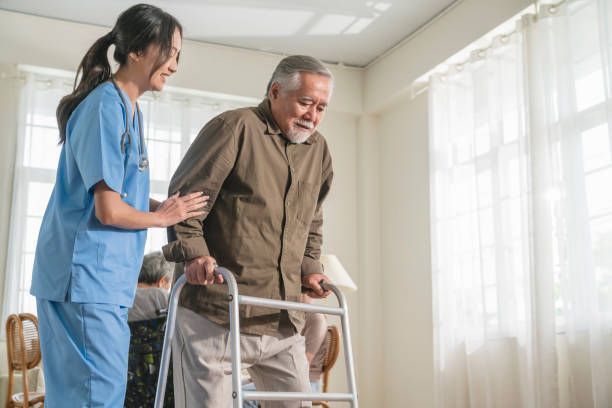Best Practices for Caregiver Body Mechanics and Injury Prevention

Providing care for the elderly or individuals with disabilities is a noble and essential profession. Home Health Aides - Caregivers at 7 Day Home Care are dedicated to ensuring the well-being of our clients in Manhattan, Queens, Brooklyn, Nassau County, and Suffolk County, New York. However, the demands of caregiving can take a toll on the caregivers' own health and well-being. In this article, we will explore the importance of proper body mechanics and injury prevention for caregivers, with a focus on ergonomics, the body parts most prone to injury, and the significance of adequate training.
Ergonomics in Caregiving
Ergonomics is the science of designing work environments and tasks to fit the capabilities and limitations of the worker. In the context of caregiving, ergonomics plays a crucial role in minimizing the risk of injury. According to the National Institute for Occupational Safety and Health (NIOSH), caregivers often perform repetitive tasks such as lifting, transferring, and assisting with activities of daily living (ADLs). These tasks can lead to musculoskeletal injuries if proper ergonomics are not employed. In a report by the Occupational Safety and Health Administration (OSHA), overexertion and musculoskeletal disorders accounted for 34% of all reported injuries and illnesses among caregivers.
Body Parts Prone to Caregiver Injuries
Caregivers are particularly vulnerable to injuries involving strains, sprains, tears, and soreness, most commonly affecting the following areas:
- Back: The back is one of the most vulnerable areas for caregivers. According to the Bureau of Labor Statistics, overexertion in lifting, pushing, or pulling objects accounts for a significant portion of caregiver injuries.
- Shoulders: Repetitive lifting and reaching motions can strain the shoulder muscles, leading to discomfort and injury.
- Knees: Frequent kneeling and bending can cause wear and tear on the knee joints, resulting in strain and pain.
- Wrists and Hands: Handling equipment and performing intricate tasks can lead to repetitive stress injuries in the wrists and hands.
Proper Training for Body Mechanics and Injury Prevention
To safeguard the health of caregivers, proper training is paramount. 7 Day Home Care emphasizes the importance of training to ensure that caregivers have the knowledge and skills to protect themselves while providing quality care. Training should cover the following key areas:
- Lifting Techniques: Caregivers must learn how to lift safely by bending their knees, keeping the object close to their body, and using their leg muscles to reduce strain on their back.
- Transfer Procedures: Proper techniques for transferring individuals in and out of beds, wheelchairs, and other surfaces are essential to minimize the risk of injury.
- Use of Assistive Devices: Training in the correct use of assistive devices, such as patient lifts and gait belts, can significantly reduce the strain on caregivers' bodies.
- Time Management: Efficient time management and organization can reduce the need for rushed movements and hasty decisions, which may lead to injuries.
Proper Body Mechanics for Assistance with Daily Living Activities (ADLs)
Caregivers are frequently involved in assisting clients with ADLs, such as bathing, dressing, and toileting. Using proper body mechanics during these activities can help prevent common caregiver injuries. Here are some recommendations:
Bathing: When assisting with activities of daily living (ADLs), such as bathing, caregivers must be mindful of their body mechanics to prevent strain or injury. Bathing often involves various movements and tasks that can put strain on the caregiver's back, shoulders, and arms. Here are some key recommendations for maintaining proper body mechanics during bathing:
- Positioning: Ensure a comfortable and safe working height that minimizes the need for excessive bending or reaching. Consider using adjustable shower chairs or benches to facilitate proper positioning for both the caregiver and the individual receiving care.
- Stability: Maintain a stable and balanced stance throughout the bathing process. Place one foot slightly ahead of the other to distribute your weight evenly and ensure better stability.
- Assistance Tools: Utilize long-handled sponges, brushes, or handheld showerheads to reach areas without excessive stretching or bending. These tools can significantly reduce strain on the caregiver's shoulders and back.
- Lifting Techniques: When assisting an individual in and out of the bathtub or shower, use proper lifting techniques. Bend your knees, keep your back straight, and use your leg muscles to lift, minimizing strain on your back and preventing back injuries.
- Communication: Maintain open communication with the individual being bathed. Inform them of each step you're about to take and encourage them to assist to the best of their abilities. This collaboration can help reduce the physical strain on the caregiver and instill a sense of independence and control for the individual receiving care.
- Assistive Devices: Consider using grab bars, shower chairs, and non-slip mats to provide support and stability during the bathing process. These devices not only enhance safety for the individual being bathed but also reduce the physical strain on the caregiver.
- Proper Body Alignment: Ensure that your body remains in proper alignment while assisting with bathing. Avoid overreaching or leaning excessively, as this can put unnecessary strain on your shoulders and back. Maintain a neutral spine position and avoid twisting or bending awkwardly.
By implementing these proper body mechanics techniques during bathing, caregivers can significantly reduce the risk of injury and strain, ensuring a safe and comfortable bathing experience for both themselves and the individuals they are caring for.
Dressing: Assisting with dressing is a common activity of daily living (ADL) for caregivers. To minimize the risk of strain or injury, it's crucial for caregivers to maintain proper body mechanics. Here are some essential tips for caregivers when assisting with dressing:
- Comfortable Positioning: Ensure that both the caregiver and the individual being dressed are in a comfortable and stable position. Consider using a chair with armrests to provide support and stability during the dressing process.
- Use of Adaptive Clothing: Opt for adaptive clothing with features such as Velcro closures, elastic waistbands, or magnetic fasteners, which can simplify the dressing process and reduce the need for excessive bending or stretching.
- Assistance Tools: Utilize dressing sticks, reachers, or long-handled shoehorns to assist with reaching and dressing tasks without overextending or straining your own body.
- Proper Lifting Techniques: If necessary, help the individual raise their arms or legs gently when putting on clothing. Use proper lifting techniques by bending your knees, keeping your back straight, and using your leg muscles to minimize strain on your back.
- Encourage Independence: Encourage the individual to participate as much as possible in the dressing process, based on their capabilities. Promote independence by allowing them to do as much as they can for themselves, only stepping in to assist when needed.
- Clear Communication: Communicate clearly with the individual throughout the dressing process, explaining each step and requesting their assistance when appropriate. This not only helps with the dressing procedure but also empowers the individual by involving them in their own care.
- Organize Clothing: Arrange clothing in a manner that makes it easily accessible, reducing the need for excessive reaching or bending. Keep frequently used items within the individual's arm's reach to promote independence and reduce strain on the caregiver.
- Stable Base: Maintain a stable and balanced stance during the dressing process. Position yourself close to the individual, and avoid awkward reaching or stretching that can strain your muscles and joints.
By following these proper body mechanics techniques during the dressing process, caregivers can reduce the risk of injury and discomfort, ensuring a smooth and comfortable experience for both themselves and the individuals they are caring for.
Toileting: Assisting with toileting is an important aspect of caregiving that requires careful attention to proper body mechanics to prevent strain or injury. Here are some key recommendations for caregivers when providing assistance with toileting:
- Use of Assistive Devices: Install grab bars near the toilet to provide support and stability for the individual. Additionally, consider using raised toilet seats to reduce the need for excessive bending and make the transfer process easier for both the caregiver and the individual.
- Proper Lifting Techniques: If physical assistance is required to help the individual transfer to or from the toilet, use proper lifting techniques. Bend your knees, keep your back straight, and use your leg muscles to lift, minimizing strain on your back.
- Communication and Dignity: Maintain open communication with the individual to ensure their comfort and dignity during the toileting process. Respect their privacy and encourage them to participate to the best of their ability while providing necessary support and assistance.
- Stable Stance: Maintain a stable and balanced stance during the transfer process. Position yourself close to the individual, ensuring that you have a firm footing to support their weight if needed.
- Encourage Independence: Encourage the individual to assist as much as possible with the transfer process, based on their capabilities. Provide guidance and support as needed, allowing them to maintain a sense of independence and control over their own toileting needs.
- Safety Measures: Ensure that the bathroom environment is free from hazards and obstacles that could cause slips or falls. Keep pathways clear, use non-slip mats, and install adequate lighting to enhance safety during toileting activities.
- Time Management: Plan toileting assistance in a way that allows for ample time and reduces the need for rushed movements. Avoid hurrying the individual or yourself, as this can increase the risk of accidents or injuries.
By implementing these proper body mechanics techniques during toileting, caregivers can reduce the risk of strain and injury while ensuring the comfort and dignity of the individuals they are caring for.
Caregivers play a vital role in supporting individuals who require assistance with daily living activities. However, it is crucial for caregivers to prioritize their own well-being by following proper body mechanics and injury prevention techniques. At 7 Day Home Care, we are committed to ensuring that our caregivers receive the necessary training and support to keep themselves safe and healthy while providing excellent care to our clients. By understanding the importance of ergonomics, recognizing the body parts most prone to injury, and receiving proper training, caregivers can minimize the risk of strains, sprains, tears, and soreness, allowing them to continue their essential work effectively and sustainably. Contact 7 Day Home care today at 516-408-0034 to learn more about our affordable in-home care services provided in Queens, Brooklyn, Manhattan, Nassau County, and Suffolk County, New York.
Brian Callahan
7 Day Home Care


Living With Parkinson’s Disease: How In-Home Care Helps Seniors Stay Safe, Independent & Comfortable








